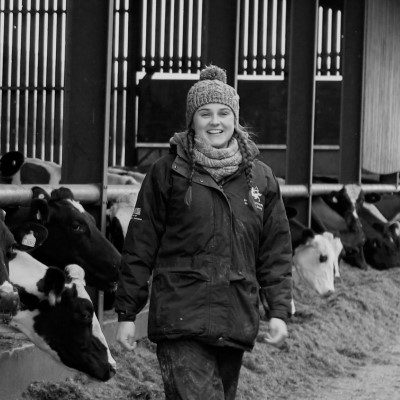CIEL | Blog: Why climate smart farming is essential for sustainable food futures
Helen Brookes

As the 2050 Net Zero target gets closer the livestock industry is facing increasing urgency to transition to climate smart farming.
Helen Brookes, Head of Business Development at CIEL, one of the Agri-Tech Centres, says it’s never been more important for industry to collaborate and find innovative ways to produce food more sustainably, while also supporting farmers to maximise their profitability.
“The need to balance increased food production with environmental conservation is more pressing than ever,” she says.
“For instance, a 64% reduction in current emissions from agriculture, forestry and land-use (AFOLU) is essential to achieve the UK’s Net Zero carbon emission target by 2050.
“This is why climate smart farming is one of our grand challenges at CIEL.”
What is climate smart farming?
Climate smart farming is fundamentally about finding new ways to ensure food security in the UK, and globally, while using fewer resources, maximising efficiency, and minimising environmental impact.
CIEL and its network of collaborative expertise are actively finding new solutions to address the Net Zero target and industry grand challenges.
CIEL’s leadership on critical industry reports such as ‘Net Zero & Livestock’ and ‘Why Protein Quality Matters in Livestock Production’, highlights its commitment to evidence-based strategies and transforming research into actionable solutions.
“Every farm is different, so we can’t treat every farm the same when looking at their ability to reduce emissions and maximise productivity to support the growing demand for a domestic food supply.
“Therefore, our reports look at what can practically be improved on-farm and importantly if there is reliable technology available to all farmers which can help them to produce food in a sustainable manner,” he says.
What can be done on-farm to make farming ‘climate smart’?
Herd and Flock Efficiency
CIEL’s ‘Net Zero & Livestock: How Farmers Can Reduce Emissions‘ report highlights that improving herd or flock production efficiency should be the focus for most farmers in the drive to reduce their carbon footprint.
By focusing on farm efficiency measures and management strategies such as age at first calving and their productive lifespan; number of offspring produced and their growth rate; and rate of milk or egg production farmers can increase productivity per animal while reducing input costs.
Reducing methane emissions
The use of rumen methane inhibitors was one of the mitigation strategies identified as having the highest potential impact for reducing the carbon footprint of dairy, beef, and sheep farms.
Whilst many methane inhibitors are not yet available or validated, CIEL’s report explores the evidence base for their efficacy and feasibility with options such as 3-NOP, nitrate, and seaweeds.
Improving protein quality
One of the ways farmers can make practical steps to farm in a more ‘climate smart’ way is to look at protein quality.


Helen Brookes, Head of Business Development
Helen and the business development team are responsible for CIEL’s Industry Members. Focusing on supporting Members to network and collaborate on industrial research along with identifying funding opportunities to support new innovations. The team also manages several projects across the agri-tech sector. Supports CIEL’s knowledge exchange activities to drive engagement in research is a key growth area within the teams remit. Helen has more than a decade’s experience working across both Research & Development and Knowledge Exchange teams, complemented by experience in the commercial and research sectors of the agricultural industry. She is passionate in driving the adoption of innovation and moving the behaviours of the industry forward to face challenges and create opportunities.






